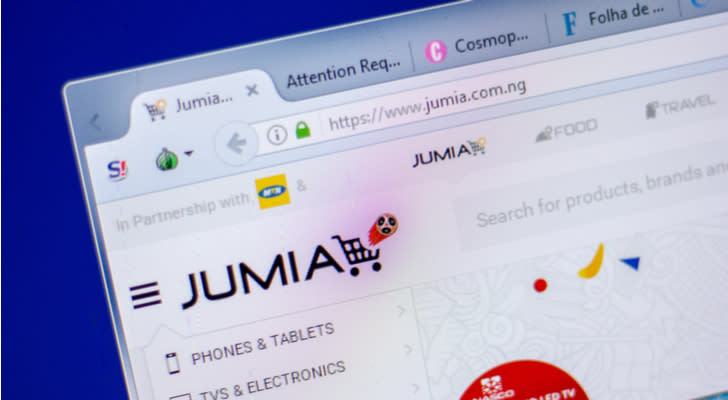The Alibaba of Africa Just Went Public
A few weeks ago, I wrote about what I considered a horrible, terrible, no good and very bad IPO, Lyft (NASDAQ:LYFT). Lyft, a “unicorn” in that it was still private despite billions of dollars invested, has since acted more like a Pegasus with a broken wing. Its first trade March 28 was at $87.24. By early April 1, it was trading at around $73.

Source: Shutterstock
Enter: Jumia, a Nigeria-based e-commerce company that recently filed an F-1 (the international version of a U.S. S-1) as it prepared to go public on the New York Stock Exchange under the ticker JMIA.
[Ed’s note: Jumia Technologies (NYSE:JMIA) went public on April 12, 2019 at $14.50 per share. It’s currently trading at $22.79 as of Friday morning.]
InvestorPlace - Stock Market News, Stock Advice & Trading Tips
Like Lyft, it is a unicorn, and parent Africa Internet Group did a $326 million funding round backed by, among others, Goldman Sachs three years ago.
Considering the failure of previous indigenous start-ups, such as Konga and DealDey, you may be skeptical of Jumia.
Don’t be.
Jumia Everywhere
Jumia got its start in 2012 with financial help from Rocket Internet (OTCMKTS:RCKZF), a German venture financier. It now operates in 14 countries around the continent, with classified ad operations in over a dozen more. Only the least-developed (like Namibia) and most war-torn (like Libya and Sudan) African nations are outside its reach
Merchandise sales transacted on its platforms were worth 828 million Euros last year, about $920 million. That is up 63% from 2017. The operating loss of 169 million Euros, about $190 million, was up just 7% from the previous year. This in a region with total consumer spending of 1.4 trillion Euros, or $1.57 trillion.
If you’ve read about Jumia, it’s probably because basketball player Andre Iguodala, an American basketball player with the Golden State Warriors whose father is Nigerian, recently joined its board, where he’ll act as a business development manager.
Brokers may call this the Amazon (NASDAQ:AMZN) of Africa, but it’s more accurate to call it Africa’s Alibaba (NASDAQ:BABA). Its electronic infrastructure is used by small producers to reach urban markets, so it takes minimal inventory risk.
Offerings vary by country. In Nigeria it’s a full online merchant, while in Rwanda it just runs classified ads and a meal delivery service, like that of Grubhub (NASDAQ:GRUB).
Jumia’s Hope
Jumia has 81,000 active sellers on its platform, and small businesses are its hope. A merchant might import a load of TVs or phones or dresses from Asia, then use Jumia to sell them throughout their country by mobile phone.
African technology operates from the outside in. There are fiber cables that run around the continent. The interior is mainly served with wireless. Some suburbs in South Africa can get speeds of over 30 mbps, but even in places like Maputo, Mozambique you see speeds Americans would have been impressed by 20 years ago.
There aren’t as many Jumia bulls as there are those who believe in Lyft or the other American unicorns due to go public in 2019. While analysts will note that Jumia still isn’t profitable, its rate of loss is narrowing significantly, something you can’t say about Lyft.
The Bottom Line
Whenever you consider a foreign investment, you need to remember that its terms and conditions are those of the country where it’s based.
In Jumia’s case this is Nigeria. There is corruption there, but legal conditions across the continent are improving, and Jumia management has been honest about its risks.
This will make Jumia an interesting speculation for a specific type of investor. It helps if you’re under 50, if this is money you can afford to lose and if you’re willing to wait several years to book your profit. But Africa is growing like no other continent, and once you understand that you may find a long-term investment in Jumia interesting.
Dana Blankenhorn is a financial and technology journalist. He is the author of a new mystery thriller, The Reluctant Detective Finds Her Family, available now at the Amazon Kindle store. Write him at danablankenhorn@gmail.com or follow him on Twitter at @danablankenhorn. As of this writing he owned shares in AMZN.
More From InvestorPlace
The post The Alibaba of Africa Just Went Public appeared first on InvestorPlace.
